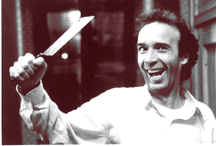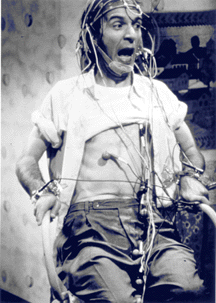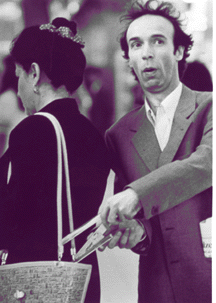Unbenign Benigni
Roberto Benigni tests the limits of comedy as a lecherous crook mistaken for a big-time slasher fiend in 'The Monster'
By Richard von Busack
NOW THAT JOHN CLEESE seems to be in semiretirement, Roberto Benigni could be described as the funniest person in the movies today. The Italian comedian, star of the two biggest hits (Johnny Stecchino and Il Monstro) in Italy's history, is to comedy what Jackie Chan is to martial arts. Benigni, however, is still waiting to be discovered by American audiences--as Chan was, until recently.
Except for small parts in two independent films by Jim Jarmusch, Benigni has appeared in only one American film. (Blake Edwards had the rare taste to hire Benigni to play Inspector Clouseau Jr. in Son of the Pink Panther.) He may not translate well here because of subtitles, and his subtitles come fast and furious. Not a sensational physical comedian, Benigni is at his funniest during a tirade--in Jarmusch's Night on Earth, he literally talks a priest to death; in his masterpiece, Johnny Stecchino, he denounces an entire opera house full of people. In full verbal fury, Benigni is more het-up than a World Cup announcer after a goal.
Still, mistaken-identity comedy and not verbal humor is Benigni's provenance, and in the American release of Il Monstro, or The Monster, he again plays a minor criminal--a scrounger and a shoplifter--mistaken for a major one. A killer is stalking the city, preying indiscriminately on anything female. Due to some circumstance it wouldn't be fair to explain, the authorities suspect the blameless Loris (Benigni), and a luscious policewoman (Benigni's real-life wife, Nicoletta Braschi--Holly Hunter with cleavage) is assigned to try to provoke him into an attack.
Braschi is a sexy innocent in The Monster, and she doesn't have enough close-ups to show off her Carole Lombard-class deadpan (as displayed in Johnny Stecchino when she was ignoring the aforementioned opera house full of people shouting denunciations at her). Despite the underuse of Braschi, The Monster gives us plenty of classic Benigni--destroying a dinner party and pissing off an apartment manager and, eventually, an entire community.
The subject is risky. At the recent San Francisco Film Festival preview screening, there were a few hisses. Still, any subject, if handled right, ought to be fair game for comedy. In The Monster, both the attacks and the victims are off-camera, and what is considered funny is not the killings but the urban terror they inspire, as well as the hyperbole of a police psychologist (Michel Blanc) describing the monster: "The word 'rape' is a euphemism for what he does. This man is the Mozart of vice."
We all may not be Mozarts, but most of us like to play around a little, and a large part of Benigni's comedy derives from the fact that he is guilty: guilty of garden-variety lechery that he's much too nice to act upon (except once, where he's instructed by a friend that a girl he's observing likes her men to pounce). When the women he's bird-dogging can't see him, Loris becomes a human version of Wolf in the Tex Avery cartoon Red Hot Riding Hood (which is quoted in The Monster). Loris' daydreams would probably sound like the drawling mutter of Avery's wolf: "First, I'm gonna love her, and I'm gonna hug her, and I'm going to kiss her."
Woody Allen, to whom Benigni bears a certain resemblance, used to intellectualize about lechery when he was around all of those stunning women he used to court and win on screen. Allen's lechery, however, is a trembling, relatively polite intellectual passion. With Benigni, it's all physical. He practically goes into point like an English setter (or like one of Avery's wolves).
The funniest bit in The Monster is a scene in which Loris loses a live cigarette butt down the front of his trousers but fails to notice until a moment after he's been distracted by a looker in a tight dress. The police, monitoring him on camera, consider his fire-fighting efforts uncontrollable psychotic masturbation. They slow the footage down to study--for forensic purposes--what they mistake as the various levels of arousal on the maniac's face, from the soul-stirring surprise upon sighting a woman's behind to the mute sigh of religious rapture and then (as his shorts smolder) the cross-eyed agony of denied pleasure, until finally, completely out of control, he pours a liter of mineral water into his pants.
BENIGNI HAS the gift of being naturally funny-looking. He possesses unruly hair, a pointed nose, a prim mouth, madman's eyes, a receding hairline and a prominent forehead--the last absolutely essential to clowning. No wonder clowns shave the area to give more room for eyebrow play. The mobile face is matched with a body as nimble as a spider's; in one scene in Johnny Stecchino, he walks up the side of a door frame to keep from being tossed out of a hotel.
His persona is beguiling but not too sweet. He's crisp enough that he can work with mentally challenged actors, as in Johnny Stecchino, without making you think of how nice he is for keeping the handicapped company. And he's given to other petty sins besides lust. His characters in both The Monster and Johnny Stecchino steal. His chronic theft of bananas made up for the sensational opera-house payoff in the latter film. When he sees a bunch of bananas at a buffet, he's certain it's entrapment, but he stares at the forbidden fruit anyway, working into a smothered version of that same ardor he evinces when he sees a bent-over woman.
He's hustling free rent and harboring illegal tenants in The Monster, and he's shoplifting again, ostentatiously buying a stick of gum to fool the cashier while being so packed full of stolen goods that he bulges. (If Benigni has just one thing to recommend him, it's that he's a comedian uninterested in settling a good example for youth.) And when provoked, he will curse. The Night on Earth sequence in Rome shows us Benigni at his most wound up. A taxi driver (Benigni) picks up an ailing priest who has a heart attack in the cab. Stimulated by the presence of a holy man, the cabbie decides to confess to his wrongdoings (sodomy upon a pumpkin and a tender-voiced sheep among them). His insane tale of indulgence is funny; funnier still is the possibility that the whole unstoppable confession was a premeditated plan to shock a priest to death. (Significantly, in the light of his anticlerical humor, Benigni once considered becoming a priest.)
BENIGNI HAILS from a small town in Tuscany--the youngest child in a family of three sisters. He went through the typical experiences of a budding Italian entertainer: circus clown, accordionist and magician's assistant. In Rome, he acted in avant-garde theater, once causing an audience stampede by an facetious antifeminist lecture. In the years to come, he would work for Bertolucci, Fellini and Costa-Gavras in small parts.
Audiences in America got a first look at Benigni in 1986, when he was imported for Jarmusch's Down by Law, playing a prisoner who goes on an escape into the swamps of Louisiana. Whatever Jarmusch's motives were for casting a sprightly comedian in a Beckett-style comedy of anhedonia, it worked, and Benigni's sequence in Jarmusch's next film, Night on Earth, was a marvel.
Benigni is as studied a director (The Monster is his first try at directing) as he is a comic. In The Monster and Johnny Stecchino, he doesn't just stack up funny stuff but instead aims for a seriously built edifice of comedy, in which material is discarded later to be picked up. (In The Monster, he returns to the dropped cigarette butt and makes it even more hilarious the second time around.) Still, The Monster shows Benigni repeating a hit formula from Johnny Stecchino, even though there's enough variation not to mind it; the next movie will tell whether he is going to dig himself a rut or not.
Then again, the comedy of confusion can have almost folk-tale simplicity. Maybe mistaken-identity comedy is refined by a Latin culture in which people are accustomed to duality. Everyone's familiar with the mother/whore dichotomy (Stecchino the gangster keeps stopping himself in his tracks, his voice choked by the holy phrase "My mother..."). Perhaps Benigni's breakthrough is the way he shows the other half of this equation: the divided male as chivalrous gentleman easily transformed into a rude, animalistic state by a well-built woman. It's easy to know about the monstrosity of man; having the peculiar courage to show it ... now, that's another matter.
[ Metro | Metroactive Central | Archives ]

Cutting-edge Comedy: Roberto Benigni cuts up in his new film, "The Monster."

Wired: Benigni's Loris records his every impulse for the police.
The Monster (Unrated; 110 min.), directed by Roberto Benigni, written by Vincenzo Cerami, Michel Blanc and Benigni, photographed by Carlo Di Palma and starring Benigni and Nicoletta Braschi.
